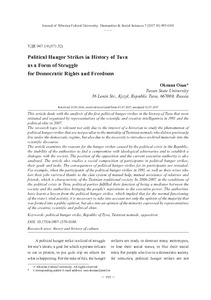Political Hunger Strikes in History of Tuva as a Form of Struggle for Democratic Rights and Freedoms
Скачать файл:
URI (для ссылок/цитирований):
https://elib.sfu-kras.ru/handle/2311/33652Автор:
Oiun, Oksana
Оюн, О.
Дата:
2017-07Журнал:
Журнал Сибирского федерального университета. Гуманитарные науки. Journal of Siberian Federal University. Humanities & Social Sciences;2017 10 (7)Аннотация:
This article deals with the analysis of the first political hunger strikes in the history of Tuva that were initiated and organized by representatives of the scientific and creative intelligentsia in 1991 and the political elite in 2007.
The research topic is relevant not only due to the interest of a historian to study the phenomenon of political hunger strikes that are not peculiar to the mentality of Tuvinian nomads who did not previously live under the democratic regime, but also due to the necessity to introduce archival materials into the scientific discourse.
The article examines the reasons for the hunger strikes caused by the political crisis in the Republic, the inability of the authorities to find a compromise with ideological adversaries and to establish a dialogue with the society. The position of the opposition and the current executive authority is also analyzed. The article also studies a social composition of participants in political hunger strikes, their goals and tasks. The consequences of political hunger strikes for its participants are revealed. For example, when the participants of the political hunger strikes in 1991, as well as their wives who lost their jobs survived thanks to the clan system of mutual help, mutual assistance of relatives and friends, which is characteristic of the Tuvinian traditional society. In 2006-2007, in the conditions of the political crisis in Tuva, political parties fulfilled their function of being a mediator between the society and the authorities bringing the people’s aspirations to the executive power. The authorities have learnt a lesson from the political hunger strikes, which implied that for the normal functioning of the state’s vital activity, it is necessary to take into account not only the opinion of the majority that was formed into a public opinion, but also into an opinion of the minority expressed by representatives of the creative, scientific and political elites В статье изучается история первых политических голодовок в истории Тувы, инициирован-
ных и организованных представителями научной, творческой интеллигенции в 1991 и полити-
ческой элиты в 2007 гг.
Актуальность темы исследования вызвана не только интересом историка изучить феномен
политических головок, не свойственных менталитету тувинцев-кочевников, ранее не живших
при демократическом режиме, но необходимостью включить в научный оборот архивные ма-
териалы.
Рассматриваются причины голодовок, вызванные политическим кризисом в республике, не-
способностью властей найти компромисс с идейными противниками и наладить диалог с об-
ществом. Также анализируются позиция оппозиции и действующей исполнительной власти.
Изучается социальный состав участников политических голодовок, их цели, задачи. Раскры-
ваются последствия политических голодовок для ее участников. К примеру, когда участники
политических голодовок и их жены в 1991 г. были лишены работы, они выжили благодаря
клановой системе взаимопомощи, взаимовыручки родных и близких, характерной для тувин-
ского традиционного общества. В 2006-2007 гг., в условиях политического кризиса в Туве, по-
литические партии выполнили свою функцию быть посредником между обществом властью,
доводя чаяния народа до исполнительной власти. Из политических голодовок власти извлекли
урок, что для нормального функционирования жизнедеятельности государства необходимо
учитывать не только мнение большинства, оформленное в общественное мнение, но и мнение
меньшинства, выраженное представителями творческой, научной, политической элит

